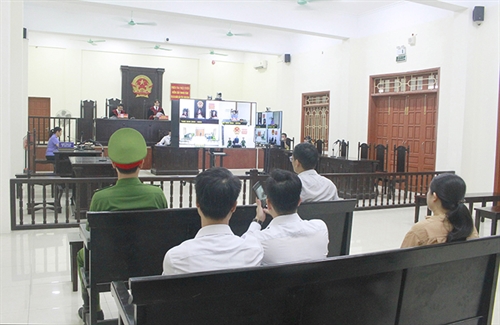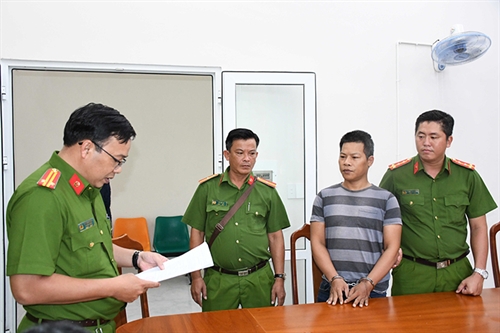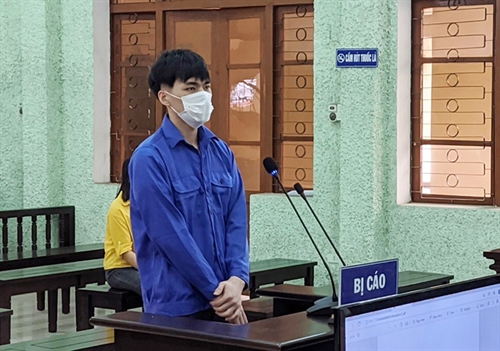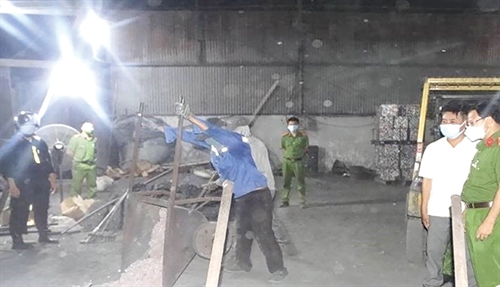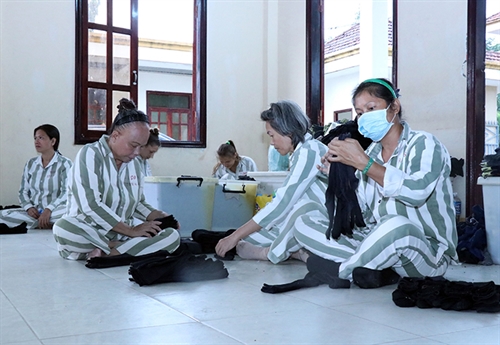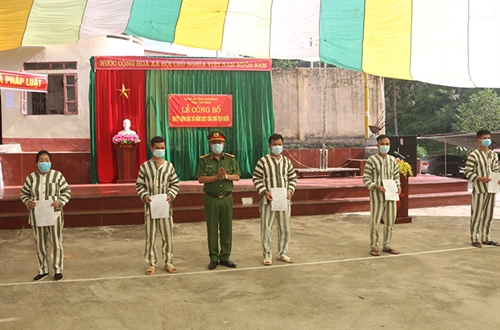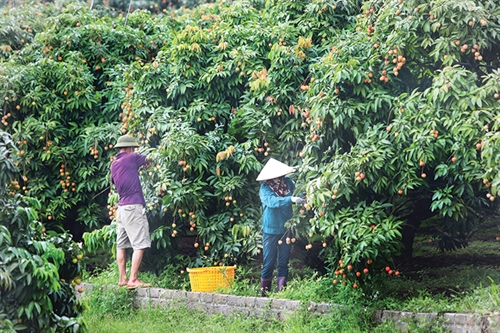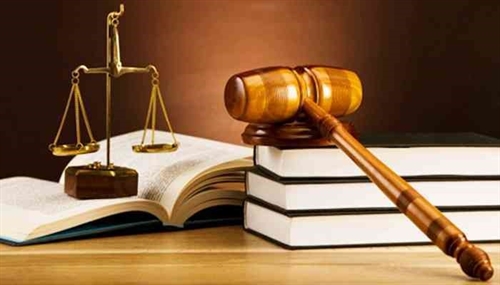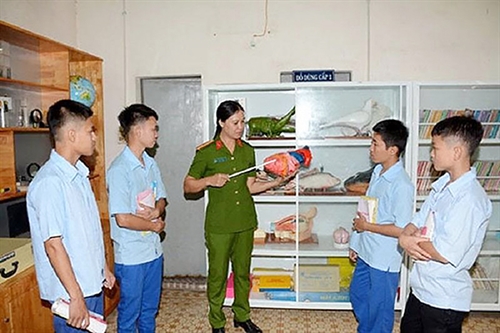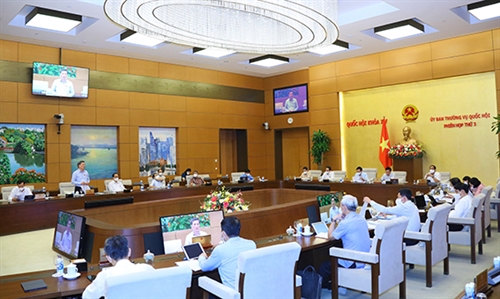In this article, the author provides an insight view of fundamental statutory principles for adjudication of offenders aged under 18 years as per the 2015 Criminal Procedure Code and the 2015 Penal Code, with practical problems and limitations encountered by courts, and makes recommendations for better guaranteeing the juvenile justice in conformity with international legal practices.
Do Thi Phuong Mai
Superior People’s Court in Hanoi
Principles of performance of criminal proceedings against juvenile offenders under the 2015 Criminal Procedures Code (CPC)
Assurance of friendly criminal proceedings suitable to age, psychology, maturity and cognitive capacity of juvenile offenders; guarantee of lawful rights and interests and best benefits of juvenile offenders
Friendly proceedings must be carried out right from the stage of arrangement of the courtroom for the hearing, which may be either friendly courtrooms or criminal case trial rooms. Criminal cases subject to trial in criminal case trial rooms include those involving defendants aged between full 16 years and under 18 years who have intentionally committed very serious crimes or have committed particularly serious crimes; those involving defendants aged between full 14 years sand under 16 years who are charged for particularly serious crimes mentioned in Articles 123, 134, 141, 142, 144, 151, 168, 169, 170, 171, 248, 249, 250, 251, 252 and 299 of the 2015 Penal Code (PC); and those involving also defendants aged 18 years or more. Criminal cases other than those mentioned above will be tried in friendly courtrooms and presiding judges of hearings may wear administrative attire instead of court dress (gown).
According to the Supreme People’s Court’s Circular 01 dated July 28, 2017, sitting positions of proceeding-conducting persons and participants and other hearing participants must be arranged on the same floor around a round table and courtroom’s walls must be painted blue. In juvenile justice hearings, juvenile offenders are required to sit next to their representatives, defense counsels or persons protecting their lawful rights and interests. Tables and chairs in courtrooms must have designs of office furniture. If no suitable courtroom is available, the existing courtroom will be decorated in a defendant-friendly manner.
In order to ensure that proceedings are suitable to the age and cognitive capacity of juvenile offenders, persons conducting proceedings for criminal cases involving juvenile offenders must be those who have been trained or have experience in investigation, prosecution and trial of criminal cases involving juvenile offenders and have necessary knowledge about psychology and education of juvenile offenders. A first-instance trial panel must have one assessor who is a teacher or Youth Union cadre or a person with experience and knowledge about psychology of juveniles[2]. These provisions help ensure effective, objective, comprehensive and appropriate settlement of criminal cases involving juvenile offenders.
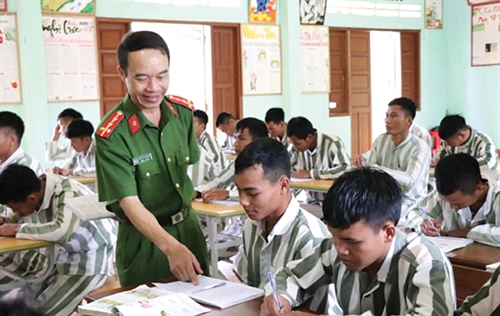 |
| Gia Trung detention camp in Gia Lai province organizes illiteracy elimination classes for prisoners__Photo: https://nongnghiep.vn/ |
Keeping of personal secrets of juvenile offenders
Hearings for criminal cases involving juvenile offenders may not be held in public or may be held in the form of in-camera hearings with limited participants and with security guards in accordance with the Supreme People’s Court’s Circular 02 dated July 28, 2017, promulgating the Regulation on organization of court hearings. This principle helps highly vulnerable juvenile offenders to reintegrate themselves into the community and prevent public discrimination against them since the prime goal of the trial of juvenile offenders is to educate them and provide them with opportunities to become useful citizens.
Assurance of the right to participate in proceedings of representatives of juvenile offenders, schools, Youth Unions, persons with experience and knowledge about juvenile psychology, and representatives of other organizations where juvenile offenders study or work
These persons have the right and obligation to participate in criminal proceedings under decisions of investigation bodies, procuracies and courts. When participating in hearings, they may present evidence, documents and objects, request replacement of proceeding-conducting persons, present their opinions and arguments, and complain about procedural acts of proceeding-conducting persons and court rulings[3]. As per Joint Circular 06 dated December 21, 2018, of the Supreme People’s Procuracy, Supreme People’s Court, Ministry of Public Security, Ministry of Justice, and Ministry of Labor, Invalids and Social Affairs, on procedures applicable to under-18 persons, these representatives include blood parents, adoptive parents, guardians[4] and persons appointed by the court.
Hearings to try juvenile offenders also require presence of representatives of schools or organizations where those offenders study or are members, unless such persons are absent not due to force majeure events or external obstacles[5]. This provision expands the range of persons permitted to participate in first-instance hearings against juvenile offenders to cover also those who have experience and knowledge about juvenile psychology, and defines their responsibility to participate in such hearings, except special cases.
Respect for the right of juveniles to participate in and present opinions at hearings
At hearings, after the inquiry is completed, procurators present arraignments. If there is no ground for making conviction, procurators will have to withdraw the whole prosecution decisions and request the court to declare defendants innocent. Subsequently, defendants present their defenses and defense counsels present defenses for defendants. Defendants and their representatives may provide additional defenses. Victims, involved parties and their representatives may present opinions to protect their rights and interests. If there are defenders of lawful rights and interests of defendants, these defenders may present or additionally present their opinions. For cases initiated at the request of victims, these victims or their representatives may present or additionally present their opinions after procurators present arraignments. Finally, the parties may present their arguments and counter-arguments in order to clarify facts of the cases.
With revised provisions compared to the 2003 CPC, the 2015 CPC provides that the inquiry of, and exchange of arguments with, juvenile defendants, victims and witnesses at hearings must be carried out in a way suitable to their age and development level.
Worthy of note, if a defendant finds it difficult to present his/her testimonies, his/her representative or parents may be asked to do so on his/her behalf. Otherwise, if the presence of a defendant’s representative or parents makes it hard for him/her to present his/her testimonies, these persons may be asked to leave the courtroom for a while. For a defendant who has committed a crime with accomplices who are considered by the presiding judge to be possibly a threat or intimidation for the defendant’s refusal to make testimonies or failure to make truthful testimonies, these persons must be isolated from the defendant in order to secure the latter’s stable psychology for making truthful testimonies.
Assurance of the right of juvenile offenders to defense counsel and legal aid
Defense counsels participate in hearings to protect lawful rights and interests of defendants as they are asked by defendants or appointed by competent bodies and accepted by the court. For juvenile defendants, the presence of defense counsels at hearings is compulsory. If juvenile defendants or their representatives or relatives do not ask for defense counsels, the court will appoint defense counsels who are lawyers or legal aid providers. The court has to postpone hearings if such defense counsels are absent, unless both juvenile defendants and their representatives request hearings to be held without defense counsels or reject the court-appointed defense counsels.
Assurance of quick and timely settlement of cases involving juvenile offenders
This principle aims to help ease psychological pressure on juvenile offenders during the proceedings against them. It is ensured by the 2015 CPC with some new provisions on the time limit for temporary detention of juvenile offenders, which is equal to two-thirds of that for adult offenders. For the trial process, right after accepting case files of juvenile offenders, the court will have to promptly assign judges to try the cases.
Principles of criminal handling of juvenile offenders under the 2015 PC
Guarantee of the best interests of juvenile offenders, primarily aiming at educating them and helping them remedy their errors, healthily develop and become useful citizens
This principle manifests the humane value and core significance of the legal provisions applicable to juveniles. To ensure proper handling of juvenile offenders, the law has specific provisions on age of juveniles to bear penal liability, scope of penal liability, exoneration from penal liability, application of penalties, etc..
Assurance that the criminal handling of juvenile offenders must be based on their age and cognitive capacity, and based on danger to the society and causes of, and conditions for, crimes they commit
It is provided in the 2015 PC that only juveniles aged full 14 years or more, who are divided in two groups of between full 14 years and under 16 years and between 16 years and under 18 years, must bear penal liability for certain very serious crimes and particularly serious crimes[6]. This provision shows that the scope of bearing penal liability is narrower than that of the 1999 PC[7]. In case of crime preparation, juveniles will be criminally charged for preparing the commission of murder or plundering property[8].
Besides, clear determination of the cognitive capacity of juveniles to be aware of their criminal acts’ danger to the society and identification of causes of and conditions for their crime commission are also requirements for the criminal handling of such persons and decision on appropriate penalties against them.
Scope of penal liability to be borne by juvenile offenders and their exoneration from penal liability
Juvenile offenders may be considered for being exempt from penal liability if falling into the following cases, having extenuating circumstances and are willing to remedy most of consequences of their crimes, provided they do not fall into the cases specified in Article 29 of the 2015 PC:
(i) Those aged between full 16 years and under 18 years who commit less serious crimes or serious crimes, except the crimes of intentionally inflicting injury to, or causing harm to the health of, other persons; rape; property robbery by snatching; illegally producing narcotics; illegally stockpiling narcotics; illegally transporting narcotics; illegally purchasing or selling narcotics; and appropriating narcotics[9].
(ii) Those aged between full 14 years and under 16 years who intentionally commit very serious crimes, except the crimes of murder; intentionally inflicting injury to, or causing harm to the health of, other persons; rape; having rape with persons aged under 16 years; having forcible sexual intercourse with persons aged between full 13 years and under 16 years; human trafficking; trafficking in persons aged under 16 years; plundering property; property robbery by snatching; illegally producing narcotics; illegally stockpiling narcotics; illegally transporting narcotics; illegally
purchasing or selling narcotics; and appropriating narcotics[10].
Decision on penalties against juvenile defendants
The court may only apply penalties against juvenile defendants if deeming that the exoneration from penal liability and application of one of the measures listed in Section 2 or application of the measure of education at reformatory specified in Section 3, Chapter 12 of the 2015 PC do not bring about education or prevention effect.
Imprisonment penalty against juvenile defendants is also imposed in a limited manner for the reason that isolation of juveniles from the community can exert negative physical and psychological impacts on them, making it much harder for them to reintegrate into the community. Therefore, the court must decide on imprisonment penalty in adherence to the principle of refraining from sentencing them to life imprisonment or death penalty. The court will impose termed imprisonment penalty against juvenile offenders only when deeming that other penalties and educative measures are not deterrent and preventive enough for them. Juvenile convicts sentenced to imprisonment may enjoy lighter sentences than those given to adult convicts for the same criminal charge. Moreover, sentences pronounced for juvenile convicts aged under 16 years may not be counted for determination of recidivism or serious recidivism.
Recommendations for improving the criminal procedure law
In order to best protect interests of juveniles, including juvenile offenders, in criminal proceedings, it is proposed to revised Article 414.1 of the 2015 CPC into: “Ensuring that procedures are friendly and suitable to age, maturity and cognitive capacity of persons aged under 18 years; best guaranteeing lawful rights and best interests of persons aged under 18 years.”[11].
Regarding the order of priority of individuals and entities to participate in criminal proceedings as representatives of juvenile offenders, Article 414.3 of the 2015 CPC should be reread as follows: “Ensuring the right to participate in the proceedings of representatives of persons aged under 18 years, persons having experience and knowledge about psychology and social affairs, schools, Youth Unions, and other organizations where persons aged under 18 years study or work or are members.”[12].
With respect to the composition of the first-instance trial panel, the author suggests specifying Article 423.1 of the 2015 CPC as follows: “The composition of the first-instance trial panel of a criminal case must have an assessor who is a teacher or Youth Union cadre engaged in training, education, protection, care for, or management of, persons aged under 18 years or who has been trained in education of juveniles or has experience and knowledge about psychology of persons aged under 18 years.”[13].
As per the inquiry of defendants, the following provision should be added to Article 423.4 of the 2015 CPC: “… When examining circumstances that might cause negative impacts on juvenile defendants, the chairing judge of the hearing may decide to isolate them. After a juvenile defendant returns to the courtroom, the chairing judge of the hearing shall notify him/her of contents that have been examined at the hearing when he/she is absent and allow him/her to raise questions to persons who have made testimonies in his/her absence.”.[14]-
[1] The Vietnamese version of this article is published on the Toa an Nhan dan (People’s Court) journal, issue No. 16 of 2022.[2] Article 415 of the 2015 CPC, which is supplemented to be more specific than Article 302 of the 2003 CPC concerning juvenile offenders.[3] Article 420 of the CPC. The 2003 CPC only provided the right to participate in proceedings of “representatives of families of the accused or defendants” whose rights and obligations remain unclear and hard to be guaranteed.[4] Guardians may be elder siblings, paternal and maternal grandparents, uncles and aunts.[5] Article 423 of the 2015 CPC.[6] As provided in Articles 123, 134, 141, 142, 143, 144, 150, 151, 168, 169, 170, 171, 173, 178, 248, 249, 250, 251, 252, 265, 266, 286, 287, 289, 290, 299, 303 and 304 of the 2015 PC.[7] The 1999 PC provided that persons aged full 14 years to under 16 years shall bear penal liability for all very serious crimes and particularly serious crimes.[8] Articles 123 and 168 of the 2015 PC.[9] Articles 134, 141, 171, and 248 thru 252 of the PC.[10] Articles 123, 134 (Clauses 4, 5 and 6), 141, 142, 144, 150, 151, 168, 171, and 248 thru 252 of the 2015 PC.[11] Article 414.1 of the 2015 CPC: “Ensuring that procedures are friendly and suitable to persons aged under 18 years in terms of their psychology, age, maturity and cognitive capacity; guaranteeing lawful rights and interests and best interests of persons aged under 18 years.”.[12] Article 414.3 of the 2015 CPC: “Ensuring the right to participate in the proceedings of representatives of persons aged under 18 years; schools, Youth Unions, persons having experience and knowledge about psychology and social affairs, and other organizations where persons aged under 18 years study or work or are members.”.[13] Article 423.1 of the 2015 CPC: “The composition of the first-instance trial panel of a criminal case must include an assessor who is a teacher or Youth Union cadre or who has experience and knowledge about the psychology of persons aged under 18 years.”.[14] This provision aims to concretize Article 309.1 of the 2015 CPC for the sake of juvenile defendants: “The chairing judge of a hearing shall decide to ask questions separately to each defendant. If testimonies of a defendant may affect those of another, the presiding judge of the hearing shall isolate the defendants. The isolated defendant shall be informed of testimonies of the previously inquired defendant and may ask questions to the latter defendant.”.
